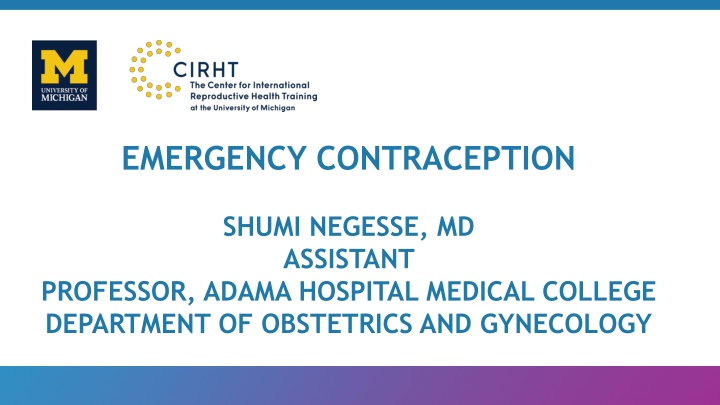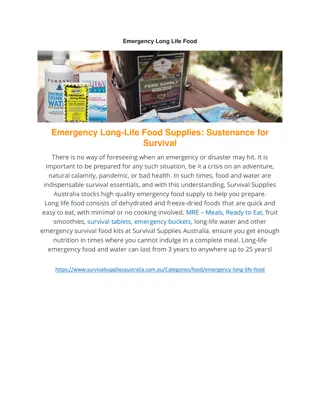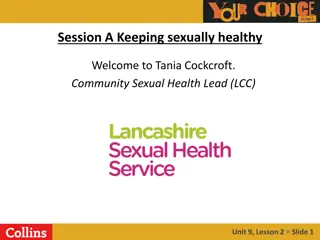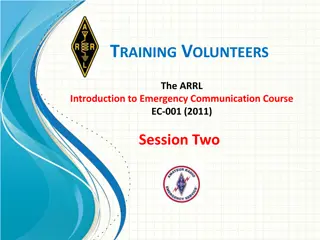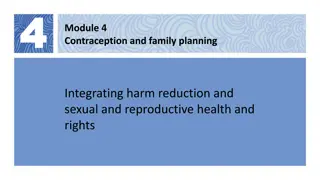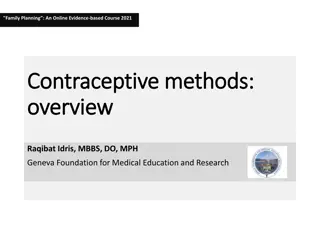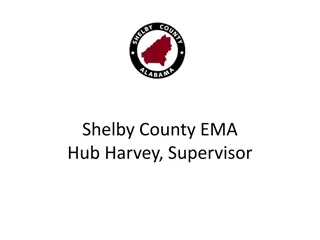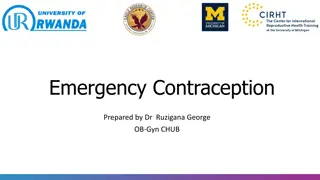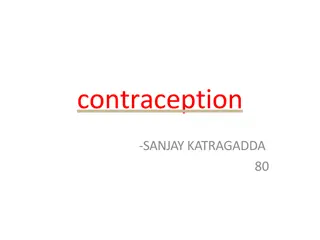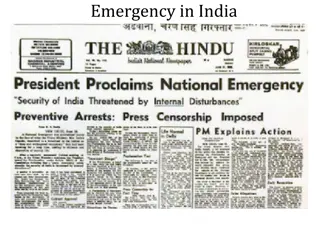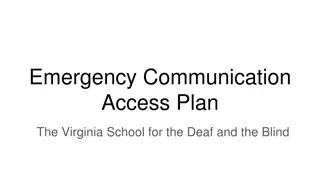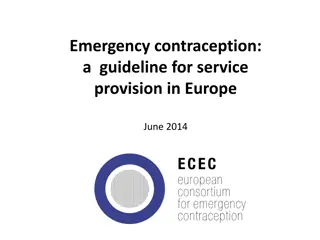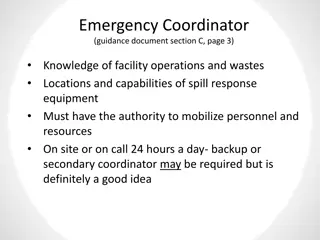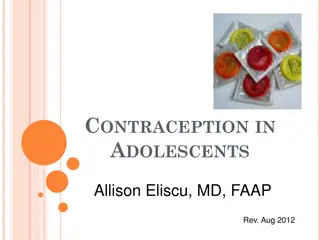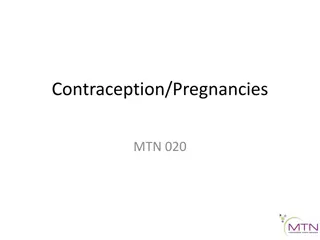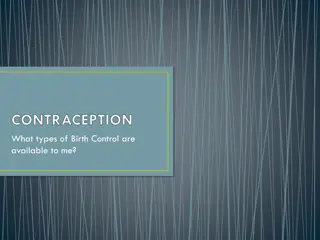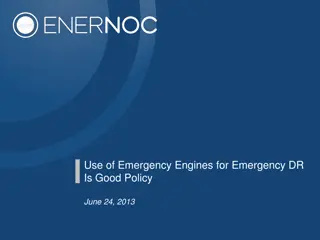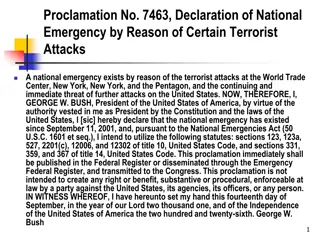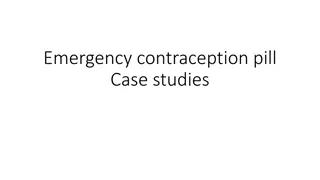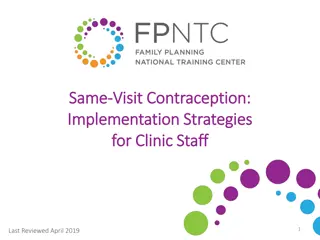Emergency Contraception Overview: Types, Usage, and Effectiveness
This presentation by Dr. Shumi Negesse provides an in-depth look at emergency contraception, including its definition, types of emergency contraceptives available, when to prescribe them, common side effects, and their effectiveness. The audience will learn about different emergency contraceptive pills and devices, when to take them, who can use them safely, and the recommended doses. The content aims to educate healthcare professionals and individuals seeking information on emergency contraception.
Download Presentation

Please find below an Image/Link to download the presentation.
The content on the website is provided AS IS for your information and personal use only. It may not be sold, licensed, or shared on other websites without obtaining consent from the author.If you encounter any issues during the download, it is possible that the publisher has removed the file from their server.
You are allowed to download the files provided on this website for personal or commercial use, subject to the condition that they are used lawfully. All files are the property of their respective owners.
The content on the website is provided AS IS for your information and personal use only. It may not be sold, licensed, or shared on other websites without obtaining consent from the author.
E N D
Presentation Transcript
EMERGENCY CONTRACEPTION SHUMI NEGESSE, MD ASSISTANT PROFESSOR, ADAMA HOSPITAL MEDICAL COLLEGE DEPARTMENT OF OBSTETRICS AND GYNECOLOGY
Outline Objectives Introduction of emergency contraceptives Types of emergency contraceptives When to prescribe emergency contraceptives Side effects of emergency contraceptive pills (ECPs) and management Effectiveness of ECPs Discussion of future contraception options Summary of the presentation
Objectives 1. Define emergency contraceptive 2. List types of emergency contraceptives 3. Identify candidates for emergency contraceptives 4. Discuss mechanisms of action 5. Explain common side effects of emergency contraceptive pills
Definition Use of drugs or a device as an emergency measure to prevent pregnancy ECPs are also called: Morning After Pill or post-coital contraceptives
Pills or Devices for Emergency Contraceptive Special ECPs with the progestin (levonorgestrel) estrogen and levonorgestrel Progestin-only pills with levonorgestrel or norgestrel Combined oral contraceptives with an estrogen and a progestin levonorgestrel norgestrel or norethindrone Intrauterine contraceptive device (IUCD)
When to take Emergency contraceptives? As soon as possible after unprotected sex Any time up to 5 days after unprotected sex
Emergency Contraceptive Pills Who is a candidate for ECPs? All women can use ECPs safely and effectively Unprotected sex Condom rupture, slippage Missed pills, 3 or more doses Sexual assault No known medical conditions make ECPs unsafe for any woman
Dose(s) of Emergency Contraceptive Pills Progesterone only dedicated product(post pill) 1.5 mg of levonorgestrel in a single dose or 0.75 mg levonorgestrel (follow with same dose 12 hours later) Most recommended ECPs
Dose(s) of Emergency Contraceptive Pills (contd) Estrogen progestin dedicated product 0.1 mg ethinyl estradiol + 0.5 mg levonorgestrel (follow with same dose 12 hours later) Progestin-only pills with levonorgestrel or norgestrel Levonorgestrel pills 1.5 mg in a single dose Norgestrel pills 3 mg in a single dose
Dose(s) of Emergency Contraceptive Pills (contd) Combined oral contraceptives 0.1 mg ethinyl estradiol + 0.5 mg levonorgestrel (follow with same dose 12 hours later) 0.1 mg ethinyl estradiol + 1 mg norgestrel (follow with same dose 12 hours later) 0.1 mg ethinyl estradiol + 2 mg norethindrone (follow with same dose 12 hours later)
Facts About ECPs Emergency contraceptive pills: Do not cause abortion Do not cause birth defects if pregnancy occurs Are not dangerous to a woman s health Do not promote risky sexual behavior Do not make women infertile
Side Effects of ECPs and Management Changes in bleeding patterns may include: Slight irregular bleeding for 1 2 days after taking ECPs Monthly bleeding that starts earlier or later than expected Nausea Routine use of anti-nausea medications not recommended Give anti-nausea medication for clients with previous ECPs use first dose of a 2-dose regimen Vomiting: If within 2 hours after taking ECPs give another dose
Side Effects of ECPs and Management (contd) No routine return visit is required However, a woman should seek follow-up care if: She thinks she might be pregnant She has no monthly bleeding Or her next menses is delayed by more than one week
Planning Future Contraception ECPs does not protect from pregnancy If she does not want to start a contraceptive method now give condoms oral contraceptives Invite her to come back anytime If possible, give her more ECPs (for future use)
Planning Future Contraception (contd) Should women use ECPs as a regular method of contraception? No Nearly all other contraceptive methods are more effective in preventing pregnancy Women who use ECPs regularly are at high risk to have unintended pregnancy
IUCD (Copper IUCD) Should be inserted within 120 hours Highly effective Can remain in place for up to 10 years Good option for long-term contraception
Some Contraindications for IUCD Uterine abnormalities/anomalies Acute pelvic inflammatory disease or in the past 3 months Pelvic malignancies: Cervical cancer and endometrial cancer Undiagnosed abnormal vaginal bleeding Allergies to copper
Other Types of Emergency Contraceptive Ulipristal acetate Highly effective and well-tolerated Can be taken up to 5 days after unprotected sex Believed to be more effective than levonorgestrel ECPs Mifepristone Highly effective, with few side-effects Both are not included in our guideline
Case Study 20 year old female college student Unprotected sex 12 hours back Last normal menses was 2 weeks back Unmarried, with no immediate plan for children On antibiotics for pelvic inflammatory disease Which of the emergency contraceptive do you recommend based on Ethiopian Ministry of Health family planning guideline?
Case Study (contd) Levonorgestrel-only dedicated pills or Postpill
Summary Levonorgestrel-only dedicated is the most recommended type of ECPs Emergency contraceptives prevent pregnancy when taken up to 5 days after unprotected sex Emergency contraceptives do not disrupt an existing pregnancy ECPs are safe for all women ECPs are not recommended as regular contraceptive methods
